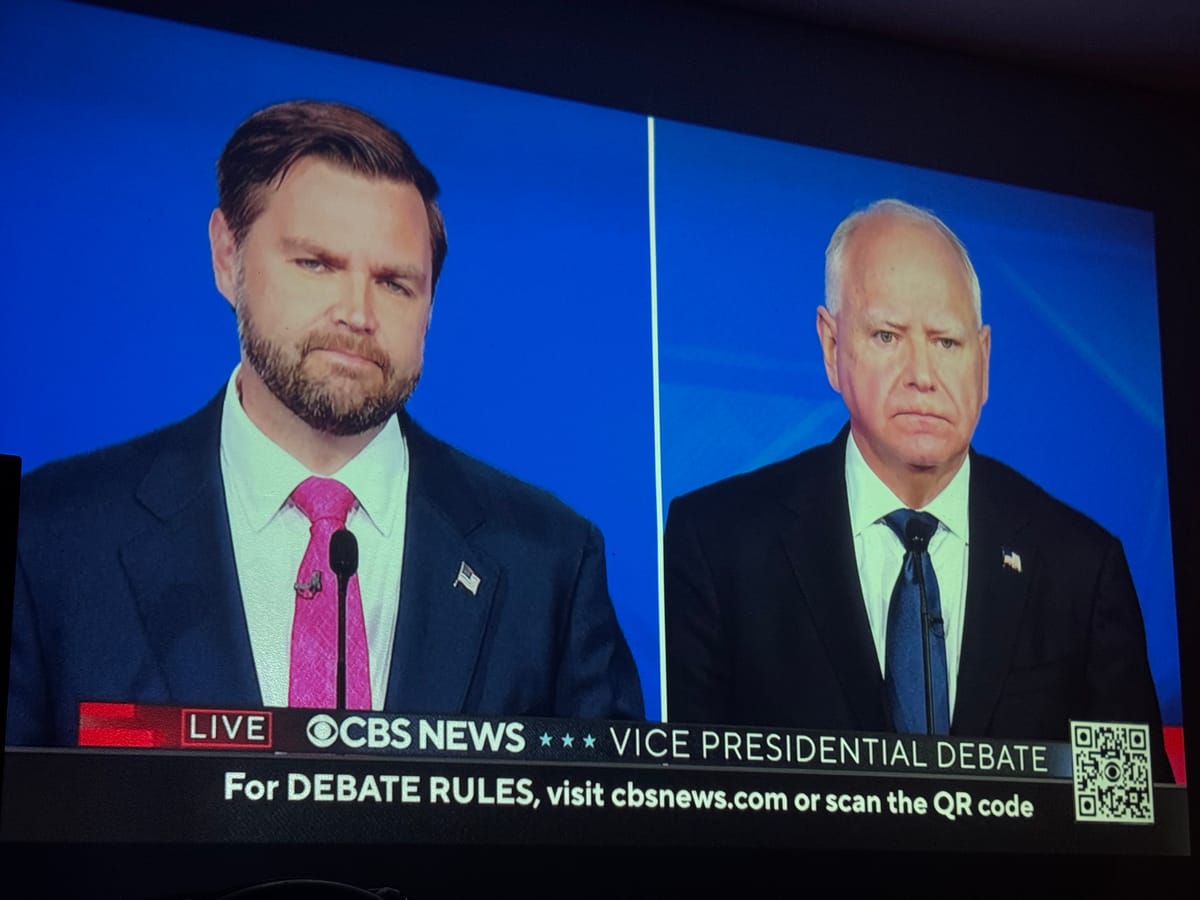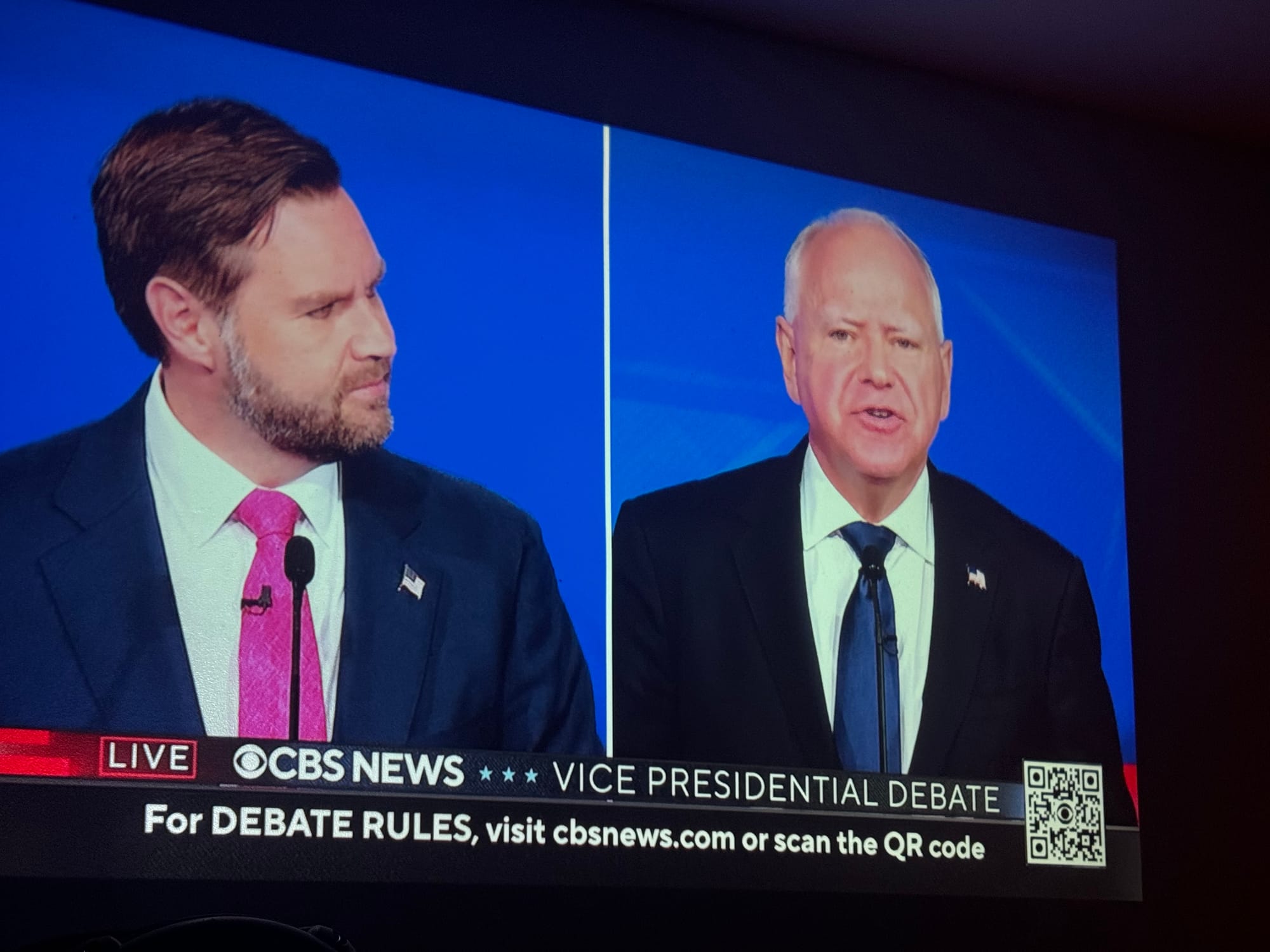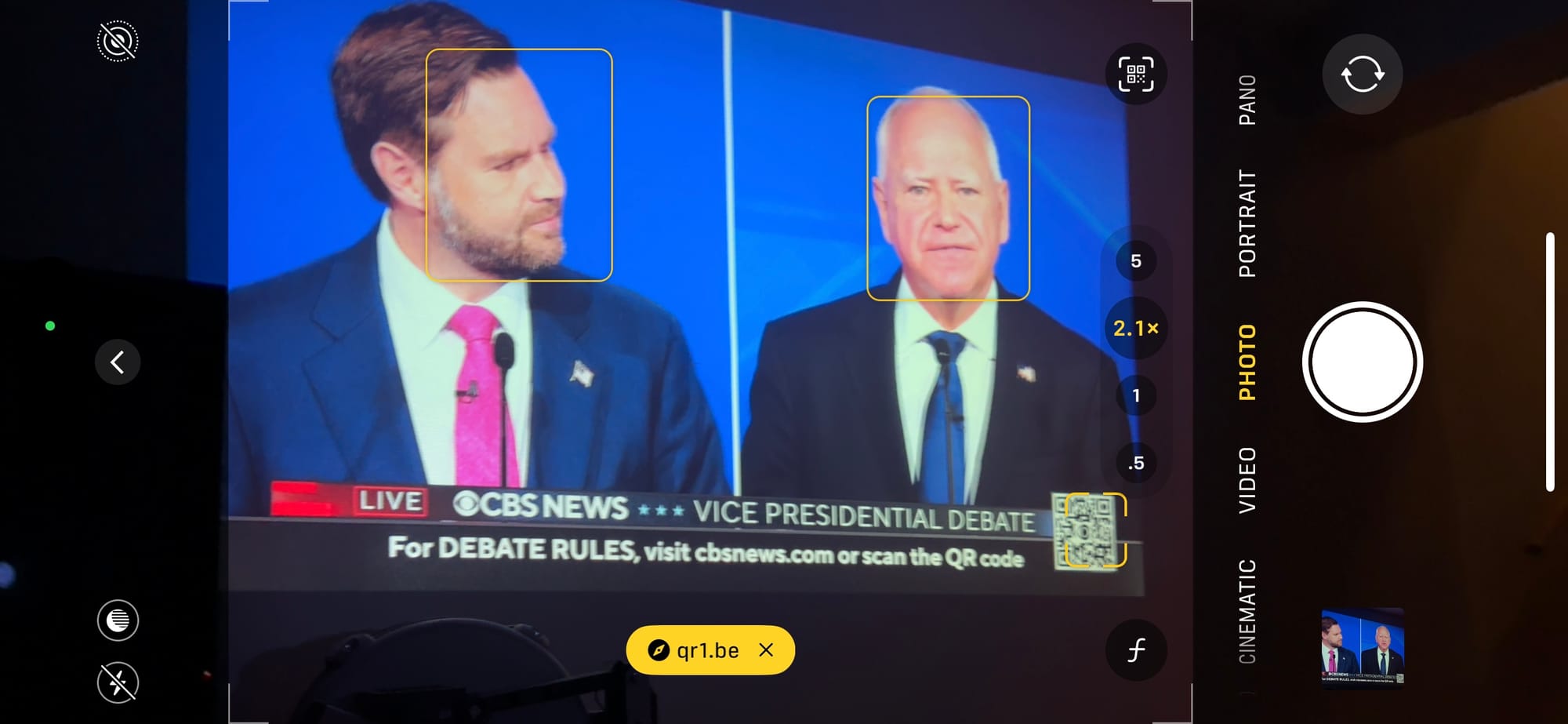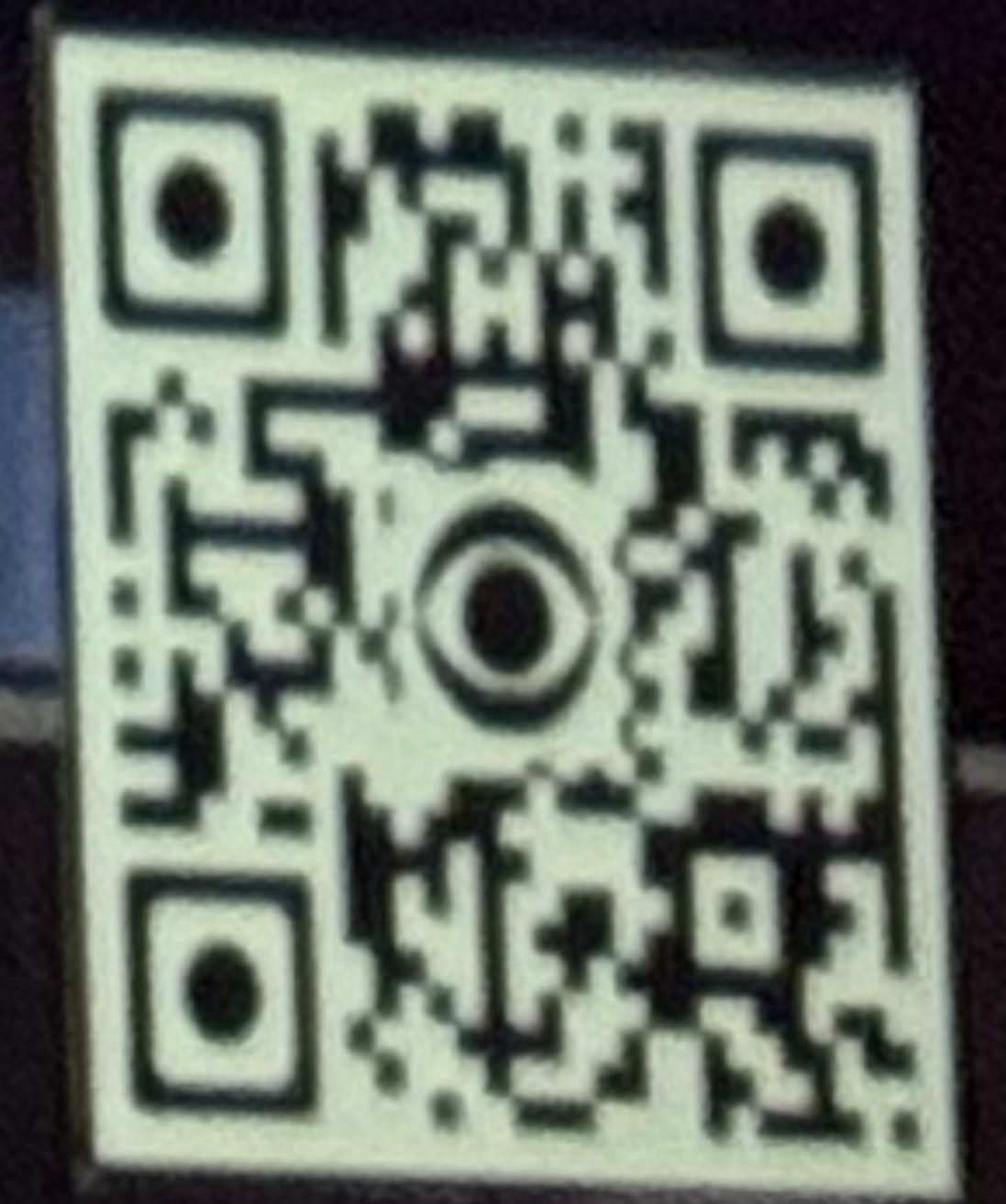What went unsaid about democracy and technology in the 2024 presidential debates

As always, thank you for subscribing and amplifying Civic Texts, which will not be sustainable without you. Many thanks to everyone who has supported my work, particularly folks who have subscribed to memberships since our soft launch in April.
Please keep sharing these newsletters on social media and forwarding them on email. Organic growth by word of mouth and social recommendations is incredibly helpful. You can always write to me with questions, comments, tips, features, or other feedback at alex@governing.digital or call/text at 410-849-9808.

Good evening from Washington, where fall has arrived with fallen leaves and pumpkins, and it’s somehow October 2. I'm still pleased about being able to easily livestream C-SPAN's livestream of CBS News' simulcast of last night’s vice-presidential debate over the Internet onto a projector.

During the debate, I was able to aim my smartphone lens at the image projected on a wall nine feet away on a dark room and scan a quick-response (QR) code, which opened up a hyperlink on the Web browser of the tablet computer.

A tap opened up a blog with fact-checks from a CBS News team, the rules of the event, a livestream, and a link to the CBS app. CBS News has now posted a transcript and fact-checks of selected exchanges.
We live in age of technological marvels that have become mundane, at least seem through the eyes this a child of the ‘80s.
I was struck today that we witnessed a different sort of miracle: a collegial debate that featured substantive exchanges moderated by two professional broadcast journalists determined to move the conversation along and ask questions again, if candidates did not answer, and capped with spouses shaking hands with the moderators.
The symbolism of Americans meeting in peace, clasping hands, and showing respect to one another and the moderators should not be lost on anyone. It matters.
This debate felt like a throwback to another time, before the debasement of the bully pulpit, between candidates who had different views about the role of government, policy, and power in American life.
There weren’t questions from the audience or from structured conversations online, just those the newsroom and the moderators had chosen, or those the candidates asked one another.
The debate wasn’t without contention nor controversy, just notably light on the personal attacks, pettiness, and puerile insults that have all too often been part of our politics for over a decade.
There were three moments that stood out to me.
🎙️ The first was a literal mic drop. In an extraordinary precedent in our (relatively short) national history of broadcast debates, CBS cut Ohio Senator JD Vance’s mic after he challenged Margaret Brennan’s fact-check about the immigration status of legal immigrants from Haiti living in Springfield, Ohio — and continued to speak about the issue. This moderating tool that went largely unused in 2016 and 2020. 2024 was different.
Second, this was likely the last debate of this election cycle, unless Trump changes his mind, bringing this phase of the election to an unusually early close — just as debates began unusually early, in June.
Early voting has now begun, which means that in a very real sense the election is at the beginning of the end, with 33 days left before Election Day. Tonight would be a good time to visit vote.gov or vote.org, make sure your registration is up to date, and make a plan to vote.
What jumped out to me tonight was the lack of any debate over three (radically different) forums about the roles information technology now plays in nearly every aspect of modern life across societies on Earth, from institutions to individual households. We didn’t hear about the role privacy, security, and democracy-affirming technologies like Signal should play in protecting and upholding freedom and liberty in the 21st century.
It’s an important omission, even if polls do show the public is far more concerned about economy, immigration, reproductive health care, inflation, wars abroad, American democracy, and the increased costs of living.
Senator Vance did decry the content moderation decisions of “big tech” companies, invoking the imitatation meat issue of ideologically motivated online censorship based upon the politics of a creator rather than the content of their characters.
But in 2024, neither man had much to say about the antitrust policies this administration had pursued to respond to anti-competitive behavior, nor how nations everywhere are responding to the growing power of tech titans and online platforms — or should.
The moderators didn’t ask the candidates about how they’ll protect privacy, identity, and security online — the big three tech policy issues for decades — nor how nations should govern or use artificial intelligence.
They didn’t ask them to contrast the legislative and regulatory remedies to the European Union has pursued with American approaches, or the lack thereof.
They didn’t ask what approaches to Internet freedom they would take if elected, nor how their administrations would modernize aging legacy IT systems across the federal government to deliver information and services in a pandemic, war, or natural disaster.
They didn’t ask if they supported the law to force ByteDance to divest from TikTok, or what approaches to data protection or keeping kids safe and healthy online they favor, and why.
We didn’t hear how or if their administrations would apply emerging technologies to reduce carbon emissions, make cancer vaccines, or prepare for the next pandemic.
I’ll be honest: I didn’t expect much discussion about any of these topics when I logged on, but their near-total absence feels notable, even if technology policy has never been central to past presidential debates.
That feels off in late 2024. 19th century institutions are governing 21st century technologies with 20th century laws. The U.S. government can and should do better in 2025.
Americans deserve to hear more from these folks in press conferences, town halls, and online forums before and after the election.
Vance and Walz spent some time sparring about the differences between free speech on social media platforms, free speech in theaters — which I suspect caused First Amendment scholars watching to intellectually combust around the nation — and incitement to seditious mob violence.
When pressed about either he and Trump would challenge electoral votes if verified by the states, howerver, Vance did not do so.
He did say that “if Tim Walz is the next vice president, he'll have my prayers, he'll have my best wishes, and he'll have my help whenever he wants it“ and that “if we want to say that we need to respect the results of the election, I'm on board.”
But there has been no sign since that the man at the top of the ticket will offer his best wishes to Vice President Kalama Harris and Walz should they win election, nor that Trump will accept the results of the election as legitimate after November 5, 2024, should the states certify a winner and legal challenges in courts fail.
Trump did neither when he lost re-election in 2020 and refused to concede and cooperate with a presidential transition.
Trump’s lie about widespread election fraud in American cities has now become an “alternative fact” in the bespoke unrealities of the Fox Cinematic Universe.
Many of our neighbors have now been successfully inoculated against trusting members of the press, election administrators, scientists, academics, or public health workers.
Trump partisans have been primed for political violence during the election and state violence afterwards with dehumanizign rhetoric, increasingly directed against immigrant and marginalized communities.
2024 is likely to get bumpier for a while. Stay safe and steady, all.



